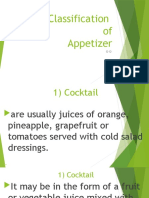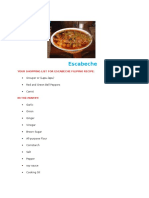0 ratings0% found this document useful (0 votes)
594 views(Research) History of Appetizers: Tle Reviewer
(Research) History of Appetizers: Tle Reviewer
Uploaded by
Reyvenne Grace1. Appetizers originated in ancient Greece as small meals served before the main course, but did not become popular until the 19th century when meals evolved to have more courses.
2. Appetizers, also called hors d'oeuvres, are small dishes served before the main course to stimulate appetite. Common types include dips, fruits/vegetables, meats/cheeses, canapés, vol-au-vents, and sweet-savory foods.
3. Cold hors d'oeuvres are served chilled with or without dip, while hot hors d'oeuvres are small warm bites. Canapés are small pieces of bread or crackers topped with
Copyright:
© All Rights Reserved
Available Formats
Download as DOCX, PDF, TXT or read online from Scribd
(Research) History of Appetizers: Tle Reviewer
(Research) History of Appetizers: Tle Reviewer
Uploaded by
Reyvenne Grace0 ratings0% found this document useful (0 votes)
594 views4 pages1. Appetizers originated in ancient Greece as small meals served before the main course, but did not become popular until the 19th century when meals evolved to have more courses.
2. Appetizers, also called hors d'oeuvres, are small dishes served before the main course to stimulate appetite. Common types include dips, fruits/vegetables, meats/cheeses, canapés, vol-au-vents, and sweet-savory foods.
3. Cold hors d'oeuvres are served chilled with or without dip, while hot hors d'oeuvres are small warm bites. Canapés are small pieces of bread or crackers topped with
Original Description:
akd
Original Title
Tle Reviewer q2
Copyright
© © All Rights Reserved
Available Formats
DOCX, PDF, TXT or read online from Scribd
Share this document
Did you find this document useful?
Is this content inappropriate?
1. Appetizers originated in ancient Greece as small meals served before the main course, but did not become popular until the 19th century when meals evolved to have more courses.
2. Appetizers, also called hors d'oeuvres, are small dishes served before the main course to stimulate appetite. Common types include dips, fruits/vegetables, meats/cheeses, canapés, vol-au-vents, and sweet-savory foods.
3. Cold hors d'oeuvres are served chilled with or without dip, while hot hors d'oeuvres are small warm bites. Canapés are small pieces of bread or crackers topped with
Copyright:
© All Rights Reserved
Available Formats
Download as DOCX, PDF, TXT or read online from Scribd
Download as docx, pdf, or txt
0 ratings0% found this document useful (0 votes)
594 views4 pages(Research) History of Appetizers: Tle Reviewer
(Research) History of Appetizers: Tle Reviewer
Uploaded by
Reyvenne Grace1. Appetizers originated in ancient Greece as small meals served before the main course, but did not become popular until the 19th century when meals evolved to have more courses.
2. Appetizers, also called hors d'oeuvres, are small dishes served before the main course to stimulate appetite. Common types include dips, fruits/vegetables, meats/cheeses, canapés, vol-au-vents, and sweet-savory foods.
3. Cold hors d'oeuvres are served chilled with or without dip, while hot hors d'oeuvres are small warm bites. Canapés are small pieces of bread or crackers topped with
Copyright:
© All Rights Reserved
Available Formats
Download as DOCX, PDF, TXT or read online from Scribd
Download as docx, pdf, or txt
You are on page 1of 4
TLE REVIEWER
(Research) that will satisfy their hunger to the
HISTORY OF APPETIZERS fullest.
You might be familiar for the
Appetizers were originally French name for appetizers: Hors d’
introduced by the Athenians as a buffet oeuvre. While “appetizer” refers
in the early third century B.C. They specifically to building the appetite,
would serve sea urchins, cockles, Hors d’ oeuvre literally means, “outside
sturgeon, and garlic. However, they of the masterpiece.”
were unpopular to start as these tiny The Ancient Romans and Greeks
meals weren’t followed up with a main are depicted lounging with trays of fresh
course, leaving everyone hungry and fruit, wine, olives and cheese. Their
wanting more. It wasn’t until the feasting style surely inspired our
nineteenth century that appetizers truly modern-day appetizers. Their meals are
caught on, as meals evolved into more of said to have been (pardon the choice of
a structured ordeal. words) an orgy of Hors d’ oeuvre. These
Aperitifs cam about by the Romans included fish and seasoned vegetables
and were classified as a liquid appetizer also. The main course (whenever they
that typically contained alcohol. In got to it) featured some of the same
addition to inciting hunger like food foods, in every large quantity.
appetizers, the purposes for aperitifs All through history, those who had
were also meant to help with the the means to secure large quantities of
imminent digestion process. These food, and to entertain, have enjoyed
drinks would be shared from a single stretching the mealtime and
glass and passed around the table to all conversation experience by serving a
the members of the eating party. variety of successive courses, beginning
Aperitifs are still utilized today, typically with finger foods, many of which were
with the company of food appetizers. often on the salty side, to stimulate the
The word itself, “appetizer”, as appetite. There is a sense of leisure and
being used in the Americas and England abandonment to it all; and certainly of
in the 1860s, is more of a local flavor abundance.
then “hors d’ oeuvres”. For a time, During the Renaissance (14th to 17th
appetizers are served between the main century), physicians recommended
course and dessert as a refresher, but by eating small morsels of salty meats prior
the twentieth century they had taken to a meal in order to prepare the
their place as a precursor to the main digestive system for the main course and
course. On the other hand, it is said that to ensure proper digestion. Appetizers
appetizers are the dishes that can truly have been served in nearly all cultures.
be considered Filipino because we are Historians believe this practice evolved
best known for using our hands to eat quite naturally after we set aside our
the small finger food that come with the hunter-gatherer lifestyle and became
first course. Appetizers can include sedentary; perhaps an instinctive
anything from fish to meat, nuts and evolution of our grazing days, when
chips. They are often served before small bites of fruit and nuts indeed set
dinner or at large family lunches. the tone for the long-awaited real meal.
Prior to the nineteenth century,
appetizers were typically available
The dishes we serve prior to the throughout a meal. Then, the succession
main course are designed to what the of courses we know today became
appetite and set the tone for the meal. common practice. At this time,
They occupy the mind and belly while appetizers change radically, becoming an
dining guests wait for the centerpiece ever more refined aspect of the meal and
TLE REVIEWER
becoming a separate course altogether. o Fruit trays offer strawberries,
This is the when the term “appetizer” grapes, cantaloupe, honey dew,
enters common usage. watermelon, pineapple, ang other
We turn to the French again for fruits paired with a sweet or
one additional observation. While hors d’ yogurt- based dip.
oeuvre refers to the part of a meal one 3. Meal and Cheese Trays – another
may indulge in prior to the chef’s appetizer option and feature a
masterpiece, amuse-gueules, a term that variety of meats and cheeses for
is often used interchangeably with guests to choose from
appetizer (or hors d’ oeuvre) means –
“teaser for the palate,” and refers to sandwich rolls are often included
small buffet-style dishes served at – can also
parties rather than an introductory be served alone as finger foods
course to a meal. o Meat trays offer cold cuts ranging
from salami, pepperoni, ham,
WHAT IS APPTEZER? roast beef, and turkey.
o Cheese trays frequently include
Appetizer American, Swiss, cheddar, hot
- a small dish of food or drink taken pepper, and sometimes exotic
before a meal or the main course cheeses such as brie.
of a meal to stimulate one’s 4. Canapés – a small prepared hors d’
appetite oeuvres that is easy to pick up with
- also called as hors d’ oeuvre fingers and can usually be eaten in
- meant to stimulate your appetite, one bite
making you extra hungry for your – consist of a bread or
meal cracker base, usually topped with a
- “something to whet the appetite” thin spread, a main ingredient, and
or “something to appetize” a garnish
- can be eaten during cocktail hour – a small piece of bread
or can serve as the only meal at a or pastry with a savory topping,
casual party or small gathering often served with drinks at
reception or formal party
WHAT ARE THE TYPES OF 5. Vol-au-vents – small puff pastries
APPETIZERS? with a morsel of flavorful food
o The puff pastry used for vol-au-
TYPES OF APPETIZERS vent usually looks like a small pot
1. Dips – served with chips, pieces of with a lid and is filled with a
bread, or vegetables cream-sauce based filling of
– can be served hot or cold vegetables, chicken, fish or other
2. Vegetable and Fruit Tray – are meat
often featured at parties and group 6. Sweet-Savory Foods – often
gatherings combines a sweet dry fruit with a
– can savory meat or a sharply-flavored
allow guests to enjoy fresh and cheese.
healthy appetizers 7. Chicken Wings
o Vegetable trays often include 8. Mini Quiches
carrots, celery, cucumbers, 9. Mini Tacos
peppers, radishes, tomatoes, and 10. Meatballs
a host of other vegetables along 11. Onion Rings
with a ranch dressing or 12. Potato Skins
vegetable dip. 13. Mini-sandwich Tray
TLE REVIEWER
- common accompaniment to
WHAT IS THE COLD HORS D’ aperitifs, cocktails served prior to
OEUVRES? a meal
Cold Hors d’ oeuvre
- appetizers that are served cold, Hors d’oeuvres
with or without dip or sauce - may also be served at long parties
- they can be served on ice, but are that occur after a regular mealtime
perfectly fine room temperature
- they tend to be overly simple LESSON 8.1.1: KINDS OF APPETIZERS
- real ingredients should be used
instead of processed ones Classification of Appetizers
1. Fruit Appetizers – these are light
WHAT IS THE HOT HORS D’ OEUVRES? and refreshing fruits in season–
fresh or preserved, sliced, diced, or
Hot d’ oeuvres scooped
- are served warm and are often 2. Canapes – these are small pieces
bite-sized of bread, toast, or crackers spread
- can be either finger foods and or topped with highly seasoned
snack type foods or small portions food mixture
of main course dishes 3. Grilled or Over-the-Coal
Appetizers – these are more
WHAT IS CANAPÉ? popular when served outdoors, and
guests, attend to the grilling
Canapé 4. Party Breads and Pastries – these
- a small piece of bread or pastry come in attractive colors, in
with a savory topping, often served various shapes, and with different
with drinks at reception or formal fillings
party 5. Tasty Tidbits – they can be served
- a small prepared hors d’ oeuvres in small trays, in glass bowls, in
that is easy to pick up with fingers wood or ceramic containers or in
and can usually be eaten in one toothpicks arranged artistically in
bite a hors d’oeuvre holder covered
- consist of a bread or cracker base, with aluminum foil
usually topped with a thin spread, 6. Vegetable Hors d’ oeuvres – these
a main ingredient, and a garnish are salty, tart, or crisp food that
use vegetable slices as base
(Book) 7. Beverages – these are seasonal or
LESSON 8.1: APPETIZERS specially prepared drinks
– alcoholic or non-
Appetizers alcoholic
- are small portions or bite-sized
delicacies that are served before a LESSON 8.1.2: COLD HORS D’OEUVRES
meal
- can be eaten during cocktail hour Cold Hors d’oeuvres
or can serve as the only meal at a - appetizers that are served cold,
casual party or small gathering with or without dip or sauce
- finger foods usually served prior to - they can be served on ice, but are
a meal, or in between mealtimes, perfectly fine room temperature
and are also called hors d’oeuvres - they tend to be overly simple
TLE REVIEWER
- real ingredients should be used o Barquettes or tartlets are boat-
instead of processed ones shaped pastry shell with a savory
filling.
The following are some kinds of cold o The pastry shells are baked ahead
appetizers. of time and then filled before
1. Canapés – type of hors d’oeuvres, serving so that they do not
or small, single-bite food that is become soggy.
traditionally made with a base of a 3. Meatball – is ground or minced
small piece of bread with some meat rolled into a small ball,
sort of topping sometimes along with other
– finished with a garnish ingredients
2. Crudités – traditional French – the term is sometimes
appetizers consisting of sliced or extended to meatless versions
whole raw vegetables which are based on vegetables or fish
sometimes dipped in vinaigrette or 4. Rumaki – these appetizers are of
other dipping sauce mock-Polynesian or Hawaiian
3. Meats and Cheese – A meat and origin, consisting of bacon
cheese tray or platter features wrapped around the water
various cured meats or cold cuts chestnuts or fruit and pieces of
and cheeses, cut into bite size duck or chicken liver
pieces and artfully arranged on a 5. Potato Skins – are a snack food or
serving dish appetizer made of unpeeled potato
4. Mini Sandwiches – easy to handle halves, hollowed and dressed with
and should not be too filling bacon, cheddar cheese and green
5. Spreads and Dips onions
o spread a mixture made of pureed – commonly found
meats, fish or cheese combined on the menus of casual dining
with herbs or vegetables restaurants, which are known for
o dip is looser and softer than a serving them.
spread
LESSON 8.1.3: HOT HORS D’OEUVRES 6. Chicken Wings
o chicken wings – most popular
Hot Hors d’oeuvres variant of this appetizer is
- that are cooked and served warm buffalo chicken wings
– a dish of
The following are some kinds of cold deep-fried chicken wings tossed
appetizers. in a sauce
1. Brochettes – refers to food cooked, 7. Rissoles – consist of mixture of
and sometimes served, on minced meat, poultry, or seafood,
brochettes, or skewers compressed and rolled in
– generally grilled breadcrumbs, then deep fried or
– the French term baked
generally applies to French – they can also refer to a
cuisine, while other terms like variety of fillings enclosed in a
shish kebab or satay describe the crescent-shaped pastry and then
same technique in other cuisines deep fried.
2. Filled Pastry Shell – Bouchées are
small, hollow cases of puff pastry
filled with a savory mixture.
You might also like
- Tle 2Document39 pagesTle 2Irish Santos-GozunNo ratings yet
- AppetizerDocument12 pagesAppetizerEthyle Morales LingbawanNo ratings yet
- Appetizers: History of AppetizerDocument11 pagesAppetizers: History of AppetizerRhuel MalquistoNo ratings yet
- The Circulatory and Respiratory SystemDocument2 pagesThe Circulatory and Respiratory SystemJamila Manonggiring100% (1)
- Canape DemoDocument8 pagesCanape DemoRaquel ArtisuelaNo ratings yet
- Presentation 1Document51 pagesPresentation 1Elna Agustino ProvidoNo ratings yet
- List of Ingredients According To The Given RecipeDocument4 pagesList of Ingredients According To The Given RecipeElrose Jean Alloso TocaoNo ratings yet
- Classification of AppetizerDocument22 pagesClassification of AppetizerJaideHizoleSapulNo ratings yet
- Module 2 Lesson 1-Tools and Materials Used in EmbroideryDocument7 pagesModule 2 Lesson 1-Tools and Materials Used in EmbroideryRoderick Viloria MiloNo ratings yet
- LAS Q2-WEEK 3-TVL-COOKERY NC II - Grade 11Document4 pagesLAS Q2-WEEK 3-TVL-COOKERY NC II - Grade 11Xian Julz PaezNo ratings yet
- The 5 Basic Elements of Plating 2.0Document27 pagesThe 5 Basic Elements of Plating 2.0Khate Anne Canlas100% (1)
- Activity Sheet in CookeryDocument7 pagesActivity Sheet in CookeryNicaa EngueroNo ratings yet
- Learning Outcome 4 Store Starch and Cereal DishesDocument6 pagesLearning Outcome 4 Store Starch and Cereal Dishesloiz eliseoNo ratings yet
- 1 Quarter Examination Tle 9: Tuyan Integrated SchoolDocument18 pages1 Quarter Examination Tle 9: Tuyan Integrated SchoolKaren PlazaNo ratings yet
- Cooking Utensils List That Every Kitchen NeedsDocument50 pagesCooking Utensils List That Every Kitchen NeedsBaby MacNo ratings yet
- Grade 9 Cookery 2Document66 pagesGrade 9 Cookery 2Bethrice Melegrito100% (1)
- Classifications of Salads According To Ingredients UsedDocument9 pagesClassifications of Salads According To Ingredients UsedNerissa DollenteNo ratings yet
- EPP-AGRI - Q1 - Module 2 - Week2Document16 pagesEPP-AGRI - Q1 - Module 2 - Week2Alfonso CaranguianNo ratings yet
- Egg Preparation Grade 10Document23 pagesEgg Preparation Grade 10RolenOtipepCaboverdeNo ratings yet
- Seminar Grade 9 p6 - LATESTDocument44 pagesSeminar Grade 9 p6 - LATESTEdison OrgilNo ratings yet
- Name: - Section: - Teacher: - DateDocument4 pagesName: - Section: - Teacher: - DateJaideHizoleSapul100% (1)
- Kitchen Tools and EquipmentDocument50 pagesKitchen Tools and Equipmentfernandez ararNo ratings yet
- TLE 9 COokery PDFDocument18 pagesTLE 9 COokery PDFSusan Sanoy SalvaNo ratings yet
- Caregiving Tools, Equipment, and Paraphernalia: ObjectivesDocument9 pagesCaregiving Tools, Equipment, and Paraphernalia: ObjectivesJ samson100% (1)
- Grade 10Document3 pagesGrade 10Ayn Bajenting AringoNo ratings yet
- Summative Test in Mapeh 7Document3 pagesSummative Test in Mapeh 7Jerry PorlucasNo ratings yet
- Market Forms and Cuts of Fish POwerpointDocument14 pagesMarket Forms and Cuts of Fish POwerpointJennifer N ParagasNo ratings yet
- Assessment: Week 3 2 QuarterDocument2 pagesAssessment: Week 3 2 QuarterEilinre OlinNo ratings yet
- Tle 8 ReviewDocument33 pagesTle 8 ReviewLlemor Soled Seyer100% (1)
- Egg CookeryDocument36 pagesEgg CookerySheraine Calaycay ValdezNo ratings yet
- Basic Knife CutsDocument5 pagesBasic Knife CutslunaNo ratings yet
- Lesson 7 Guidelines in Preparing SaladsDocument3 pagesLesson 7 Guidelines in Preparing SaladsLara Yvette A. MAGNONo ratings yet
- Guidelines For Baking FishDocument13 pagesGuidelines For Baking FishLoraineTenorioNo ratings yet
- Cookery 10 MEAT PPT 1 1Document75 pagesCookery 10 MEAT PPT 1 1Ace Banggoy100% (1)
- Formative Assessment 7Document4 pagesFormative Assessment 7Junafel Boiser GarciaNo ratings yet
- Learning Delivery Modalities (LDM) 2 Module 2: Most Essential Learning Competencies (Melcs)Document6 pagesLearning Delivery Modalities (LDM) 2 Module 2: Most Essential Learning Competencies (Melcs)gloria tolentinoNo ratings yet
- COOKERY 10 Quarter 2 LAS No. 9Document4 pagesCOOKERY 10 Quarter 2 LAS No. 9Pauleen Alexa GarciaNo ratings yet
- The History of AppetizersDocument4 pagesThe History of AppetizersJanine AlcantaraNo ratings yet
- Types of BreadDocument9 pagesTypes of BreadOrtigas Aileen GraceNo ratings yet
- LM Cookery 4thquarterDocument52 pagesLM Cookery 4thquarterMarius Guerrero100% (1)
- MarchDocument5 pagesMarchXhure LicupNo ratings yet
- Tle10 He Cookery q4 Mod2 Cookingmeatcuts v4Document27 pagesTle10 He Cookery q4 Mod2 Cookingmeatcuts v4rolen umagtamNo ratings yet
- Importance of Consumer Health: HE ALT H6Document16 pagesImportance of Consumer Health: HE ALT H6eleonor ataatNo ratings yet
- FOOD PROCESSING (FISH) ModuleDocument18 pagesFOOD PROCESSING (FISH) ModuleJoseph CoralesNo ratings yet
- Grades 7-10Document8 pagesGrades 7-10Zoren AlfonsoNo ratings yet
- COOKERY 10 Quarter 2 LAS No. 10Document9 pagesCOOKERY 10 Quarter 2 LAS No. 10Pauleen Alexa GarciaNo ratings yet
- Q3 4th Summative Test Tve 8 DressmakingDocument3 pagesQ3 4th Summative Test Tve 8 DressmakingROSEMARIE HERMOSONo ratings yet
- Scrapbook in TLEDocument3 pagesScrapbook in TLECharity ButorNo ratings yet
- Tools and Materials Use in EmbroideryDocument22 pagesTools and Materials Use in Embroideryregin villasis100% (1)
- 1st Summative Test Tle CookeryDocument3 pages1st Summative Test Tle CookeryJohnFol Baynosa De SierraNo ratings yet
- History of AppetizerDocument1 pageHistory of AppetizerAngel MonsuraNo ratings yet
- COOKERY 10 Quarter 3 LAS Number 8Document9 pagesCOOKERY 10 Quarter 3 LAS Number 8Constancia PerezNo ratings yet
- TLE 9 LAS - Week 4 (Q3)Document5 pagesTLE 9 LAS - Week 4 (Q3)DelaCruz Alburo DennisMark100% (2)
- Q1 MODULE4 G9 Cookery BautistaNHSDocument10 pagesQ1 MODULE4 G9 Cookery BautistaNHSElaeca AbenNo ratings yet
- Fish Recipe ProjectDocument15 pagesFish Recipe ProjectAlexis KiokNo ratings yet
- Food Purchasing PresentationDocument13 pagesFood Purchasing PresentationKhalid P. BataraNo ratings yet
- Cookery 10 Cereals and StarchDocument62 pagesCookery 10 Cereals and StarchHANNA CLAIRE ROSAL100% (1)
- Grade 7 2ND Quarter MoDocument5 pagesGrade 7 2ND Quarter MoRafael DiazNo ratings yet
- AppetizerDocument12 pagesAppetizerBogummie Maomao100% (1)
- Week 4-AppetizerDocument2 pagesWeek 4-AppetizerJohn Ezra SustalNo ratings yet
- MCD Vs KFCDocument26 pagesMCD Vs KFCPratik PunewarNo ratings yet
- Fish and ChipsDocument4 pagesFish and Chipsfl004No ratings yet
- Listening&Speaking A1Document10 pagesListening&Speaking A1Dwi Febriana RochmahNo ratings yet
- REFLECTION: Share Your Thoughts!Document2 pagesREFLECTION: Share Your Thoughts!Christine GracianoNo ratings yet
- Biggest Loser PresentationDocument14 pagesBiggest Loser PresentationKenji Ershi ErNo ratings yet
- Banquet and CateringDocument65 pagesBanquet and CateringFernando CruzNo ratings yet
- Kisi2 Uas B.ing I & B.ing DasarDocument7 pagesKisi2 Uas B.ing I & B.ing DasarmasgonNo ratings yet
- Tatalaksana Nutrisi Dan Kesehatan Saluran Cerna Oleh DR Cut M.Gizi SPGKDocument43 pagesTatalaksana Nutrisi Dan Kesehatan Saluran Cerna Oleh DR Cut M.Gizi SPGKAthifa Abhye RiskaNo ratings yet
- Tanay West National High School: Endline SY 2013-2014Document3 pagesTanay West National High School: Endline SY 2013-2014Emeyarway Giareysie LopezNo ratings yet
- How To Lose Weight FastDocument6 pagesHow To Lose Weight FastJessica RodrigoNo ratings yet
- MCD Brand ManagementDocument30 pagesMCD Brand ManagementAnindit BorkotokyNo ratings yet
- PS450 Brunch Menu PDFDocument1 pagePS450 Brunch Menu PDFAnonymous oz97vBIi2No ratings yet
- "You Are, and You Will Be What You Eat": Cruz, Cheila Mariz DDocument2 pages"You Are, and You Will Be What You Eat": Cruz, Cheila Mariz DCheila CruzNo ratings yet
- UberEats MisclassificationDocument39 pagesUberEats Misclassificationahawkins8223No ratings yet
- No Oil No Boil - Google Search 2Document1 pageNo Oil No Boil - Google Search 2shri vigneshNo ratings yet
- Food and Cuisine of The PhilippinesDocument2 pagesFood and Cuisine of The PhilippinesArcelita Aninon MagbanuaNo ratings yet
- Assessment and Management of Patients With ObesityDocument2 pagesAssessment and Management of Patients With ObesityaliNo ratings yet
- Food BudgetDocument2 pagesFood BudgetRamesh AdhikariNo ratings yet
- Learn Tagalog ColorDocument4 pagesLearn Tagalog Colorjustinrosal05No ratings yet
- Food Festival in India 2020Document15 pagesFood Festival in India 2020Katpagam KuttyNo ratings yet
- Winter MenuDocument4 pagesWinter Menuapi-354139540No ratings yet
- Fast Food - Wikipedia The Free EncyclopediaDocument13 pagesFast Food - Wikipedia The Free EncyclopediaPrakash SphNo ratings yet
- PositionDocument4 pagesPositionAnna Marie Delos ReyesNo ratings yet
- What Comes To Your Mind When You Hear: ?: McdonaldsDocument11 pagesWhat Comes To Your Mind When You Hear: ?: McdonaldsnastasiyaNo ratings yet
- BDMO PROGRAM FEV1 enDocument3 pagesBDMO PROGRAM FEV1 enregineminoueNo ratings yet
- Bio of Tan CaktiongDocument3 pagesBio of Tan CaktiongRoseyy Galit100% (1)
- ACTIVITY 1. FEL DistributionDocument2 pagesACTIVITY 1. FEL DistributionHannah Caseria100% (2)
- Profile Info: Item Day Meal AmountDocument7 pagesProfile Info: Item Day Meal AmountNate HarrisonNo ratings yet
- Worksheet 2 Countable Uncountable NounsDocument2 pagesWorksheet 2 Countable Uncountable NounsCUATRO TINTAS CSINo ratings yet
- ENDLINE G1 WALING WALING Autonutrition Status Program Version 5.2 2Document9 pagesENDLINE G1 WALING WALING Autonutrition Status Program Version 5.2 2liliNo ratings yet

























































































